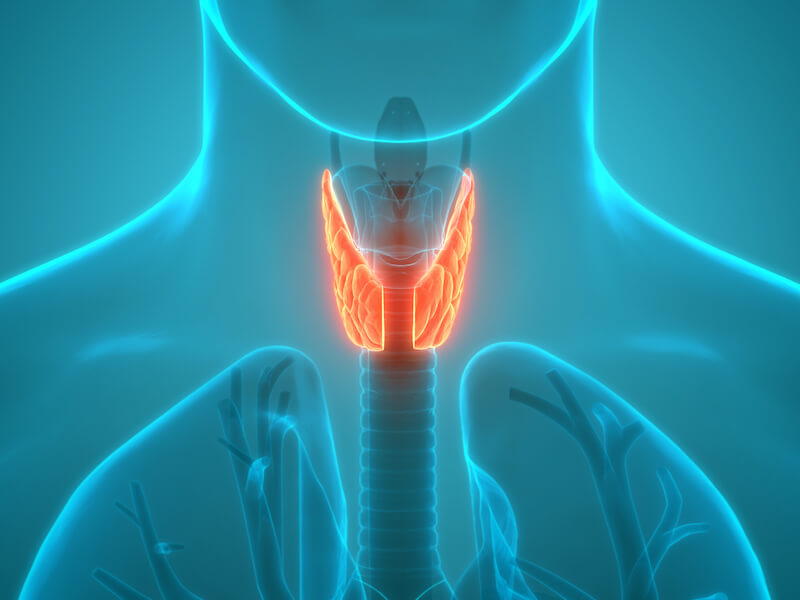
Maybe it’s your thyroid
It isn’t the first time you’ve heard this. After having an honest talk about your health problems with your best friend over dinner last night, she suggested, with some personal experience, that you might be dealing with a thyroid problem.
Thyroid conditions aren’t that uncommon as it turns out. In fact, some approximations suggest that somewhere around 200 million people worldwide suffer from thyroid problems.
So… maybe it is your thyroid!
Getting to know your thyroid
To thoroughly understand what causes problems in the thyroid gland, it’s useful to talk about what your thyroid actually does and how it ordinarily behaves.
Your thyroid is a butterfly shaped gland that sits inside your neck, just beneath your larynx. Usually, you will never even detect that it’s there, it isn’t something you can see or feel (at least, not when your thyroid is healthy).
Your thyroid breaks down iodine from your food, generating essential hormones that help your body function and control your metabolism. That makes your thyroid rather important, even if you don’t really notice it’s there.
Your thyroid can create issues in two basic ways. Either your thyroid can be too active or not active enough, in either case, you’ll begin to notice symptoms.
When your thyroid becomes overactive
A thyroid that’s overly active results in a condition known as hyperthyroidism. Too many hormones that help regulate your metabolism are created when this condition occurs. Your body’s rhythms increase. And you may believe that this will make you like a teenager again, but this elevated metabolism can cause all kinds of problems, such as excessive sweating, accelerated heartbeat, sudden weight loss, irritability, and more. You could even end up with an enlarged thyroid.
Hyperthyroidism can be triggered by a multitude of issues, from Graves’ Disease to thyroiditis. In some cases, it’s genetic or hereditary. It more commonly tends to appear in women or people with chronic illnesses.
Treatment for overactive thyroid normally includes:
- Radioactive iodine treatment
- Thionamides
- Beta-blockers,
You probably won’t start feeling better with these treatment options for a couple of months.
When your thyroid slows down
Hypothyroidism is the name for an underactive thyroid. A slower metabolism is the result. Weight gain (or the inability to lose weight even with exercise and a good diet), hair loss, sluggishness, or brittle nails are all common symptoms of this condition. You might also just be generally more tired and fatigued.
The causes of hypothyroidism may include:
- Pregnancy
- Iodine deficiency
- Pituitary disorders
- Congenital disease
Synthetic hormones are usually included in these treatments. You will typically begin feeling better after you start taking these hormones.
How can you tell which of these two conditions you’re dealing with?
It can be challenging to diagnose a thyroid condition. They can sometimes pass themselves off as other conditions. So how do you know if you’ve got a thyroid issue? If you detect any of these 6 symptoms it’s time to schedule an appointment with us.
- Sleep issues: Hyperthyroid issues can make it difficult to fall asleep at night, you have too much energy to lay still! Hypothyroidism can make it difficult to get up in the morning, you don’t have the energy to wake up! If you’re noticing either of these, it might be due to thyroid issues.
- Heart rate changes: Most individuals think of “metabolism changes” in terms of weight gain or weight loss, but the rate at which your body transforms food into energy (the broad definition of metabolism) can have physical impacts. When your thyroid causes your metabolism to speed up or slow down, for example, sudden changes in your heart rate can take place.
- Enlarged neck: Your neck, in some cases, will make space. In these cases, you might notice a growing lump on your neck. This type of growth is known as a goiter. And that goiter can be a sign of an enlarged thyroid. If you notice this, you should call us as soon as you can.
- Brain Fog: Your nervous system slows down when your body isn’t generating or using energy in an efficient way. Even your ability to think with clarity can become dull. Most doctors call this “brain fog,” and it can be a significant symptom of thyroid issues.
- Difficulty swallowing: Your neck only has so much room in there. A thyroid that is overactive will have a tendency to get bigger. And if your thyroid is growing, it’s likely to create a little bit of trouble swallowing. That’s because your esophagus may be getting crowded out by your thyroid.
- Weight changes: Weight changes can occur from both hyperthyroidism and hypothyroidism. When your thyroid is overactive, you’ll lose weight unexpectedly. That weight will be hard to shed when your thyroid is underactive. It’s not necessarily a good or bad thing to have a weight change, but it can be a bit unnerving if you don’t have any ability to control your weight.
Thyroid conditions are very treatable
You want your thyroid gland to function as healthily as possible. That way, your body gets rid of iodine, and you get the metabolism-regulating hormones you require. But if something’s wrong, we will likely be able to help you find a solution. Most thyroid conditions can be managed and treated, meaning you’ll quickly see symptom relief.
Schedule an appointment for a consultation today.